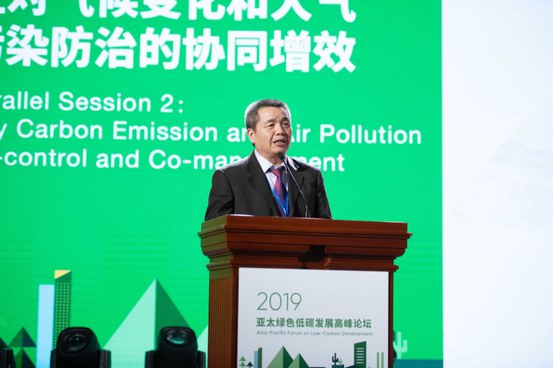Institutional Cooperation Is Key for Co-Control of Air Pollution and Carbon Emissions, Experts Say
In October 2019, Energy Foundation China (EF China), the Institute for Sustainable Communities, and the International Technical Supporting Platform for City Emissions Peaking organized a carbon emission and air pollution co-control session at the Asia-Pacific Forum on Green and Low-Carbon Development held in Changsha, Hunan Province, focusing on how cities can achieve air quality attainment and carbon emission peaking by taking synergistic measures.

Xu Huaqing Photo by Zhou Liuxin
Xu Huaqing, Director of China’s National Center for Climate Change Strategy and International Cooperation, said China needed to do more research on climate change and air pollution at the macro level, and strengthen institutional cooperation, pathway exploration, and market innovation. He suggested seeing the co-control as the linchpin to help cities achieve emission peaking and air attainment through action plans, and in turn advancing their high-quality economic development and environmental protection.

Wang Zhigao Photo by Zhou Liuxin
Wang Zhigao, EF China’s Director of Low Carbon Cities Program, said that at this stage, China’s urban emission reductions would continue to be leveraged by air quality targets. Different cities have different causes of air pollution and carbon emissions, and thus require for for different co-control strategies based on local conditions. In the future, as the potential for carbon mitigation from the industrial sector declines, attention should be shifted to the control of energy demand from the residential and transport sectors, and the decarbonization of the fuel mix, according to Dr. Wang.
More than a dozen representatives and experts from Beijing, Shenzhen, Qingdao, provinces of Hunan and Ningxia, and international organizations shared their co-control practices. They proposed to clear the roadblocks to the strategy through institutional cooperation, data and inventory methodological synergy, innovative financial tools, and key industrial breakthroughs in areas such as transportation.

Pan Shengqiang Photo by Zhou Liuxin
Pan Shengqiang, Director of Changsha’s Municipal Bureau of Ecology and Environment, said that his pioneer city planned to coordinate different institutions to promote carbon credits and capacity building, formulate key actions for climate change work, and conduct co-control analysis. Also, the city would increase funding for low carbon development and air pollution prevention, while exploring innovative financing tools, such as green credits and green bonds, said Director Pan.




